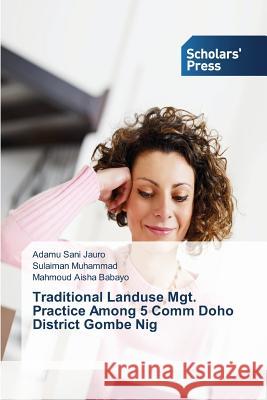Traditional Landuse Mgt. Practice Among 5 Comm Doho District Gombe Nig » książka
Traditional Landuse Mgt. Practice Among 5 Comm Doho District Gombe Nig
ISBN-13: 9783639861624 / Angielski / Miękka / 2015 / 68 str.
Assessment of traditional land-use management practices was conducted around Kwami local government, Gombe-Nigeria. A well structural questionnaire were administered randomly in five selected villages from Doho district (Alagarno, Bentere Bokki, Jauro Yaya, Jauro Alaji and Wuro Tanni) from the findings it was revealed that majority of the respondents are male and are married with low educational background i.e secondary school, and their main system of farming is mixed farming system, organic manure is the main source of their fertilizer and they are using local hand tools for must of the farming activities. Poverty, land tenure system, water erosion and leaching are the major problems affecting land-use in the study area. It was therefore recommended that Government should try and provide those communities with extension education to enable them to improve their traditional land-use management practices. This Book would be very useful to policy makers at the government ministries and agencies saddle with the responsibilities of improving landuse for agricultural purposes, and also NGO's that are interested in the attainment of food security and sustainable management of land.
Assessment of traditional land-use management practices was conducted around Kwami local government, Gombe-Nigeria. A well structural questionnaire were administered randomly in five selected villages from Doho district (Alagarno, Bentere Bokki, Jauro Yaya, Jauro Alaji and Wuro Tanni) from the findings it was revealed that majority of the respondents are male and are married with low educational background i.e secondary school, and their main system of farming is mixed farming system, organic manure is the main source of their fertilizer and they are using local hand tools for must of the farming activities. Poverty, land tenure system, water erosion and leaching are the major problems affecting land-use in the study area. It was therefore recommended that Government should try and provide those communities with extension education to enable them to improve their traditional land-use management practices. This Book would be very useful to policy makers at the government ministries and agencies saddle with the responsibilities of improving landuse for agricultural purposes, and also NGOs that are interested in the attainment of food security and sustainable management of land.











